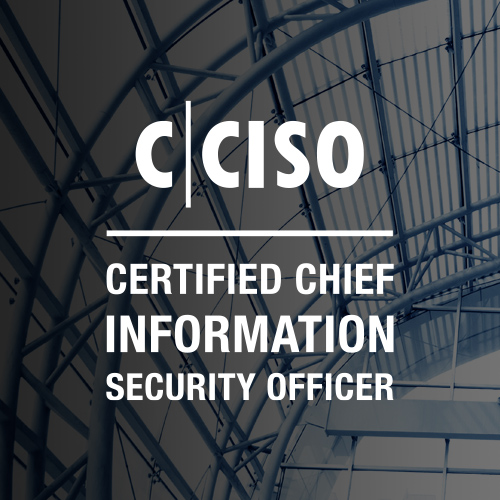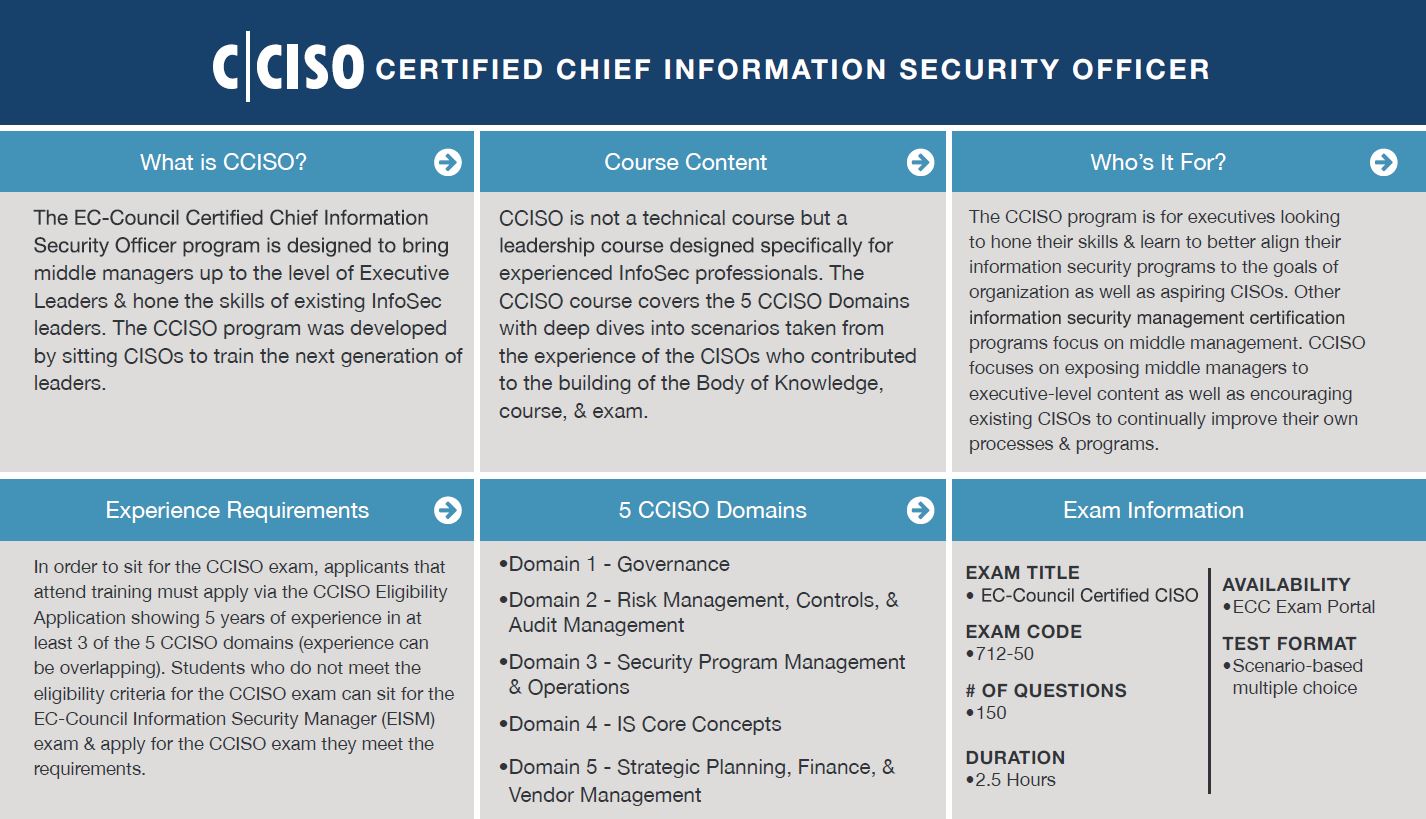
It happens across industries, from refrigerator repair to software sales. You get good enough at your job, you get promoted to management and then become an executive. The field of information security is no exception.
Maybe you’ve found yourself on this track. You’ve realized an aptitude for cybersecurity, maybe become a penetration tester, and are always advancing your knowledge of systems and their evolution. One day, someone asks you if you’d consider becoming a CISO – a Chief Information Security Officer.
What Does a Certified CISO Do?
As you might assume from the title, a chief information security officer protects a company’s data and that of its customers. Taking on this role means that you assume responsibility for identifying any security threats in your company’s system. You develop strategies for mitigating those threats and work with the company’s IT team to implement solutions.
A company that hires you as a CISO will expect you to be proactive about keeping its systems and data secure and understand risk in relation to business. You may need to conduct system audits and you’ll definitely need to be up to date with the latest developments in the field.
A CISO role is really understanding how cybersecurity ties into business goals and risk. It is not a technician role. Understanding business and how to communicate with C-Level executives and also with IT and Cybersecurity Managers is critical.
How’s the Pay?
A certified information security officer is a well-compensated professional. Payscale estimates the current average salary for the role at $155,737. By the time you reach the later years of your career, the average has risen to $168,360.
Very high-performing professionals in the field can earn more than double that. In 2016, a survey from cybersecurity staffing firm SilverBull placed the top of the average salary range at $421,000 for professionals in San Francisco. Meanwhile, similarly qualified professionals in New York were earning $406,000 in New York City.
Information security leadership is also a rewarding career from a non-monetary perspective. According to Payscale, which has gathered a 5 out of 5 job satisfaction ratings from CISO respondents, the role makes a professional feel productive, valued, and essential to client success.
The Qualifications
If you’re a CISO, you almost certainly have at least a bachelor’s degree in computer science, IT, or a similar field. Some companies also require a master’s degree, depending on the company, and most demand that you have worked in IT security for at least seven if not 10 years.
These kinds of requirements are in place because a company needs to know that you have extensive knowledge of systems and programming. What is also required, and what companies tend to have a harder time verifying, is an in-depth familiarity with the business aspects of the tech world. You’ll need to know how information security and risk affects a company on the administrative and financial levels, not just on the technical side.
Leadership Skills Matter
To succeed as a cybersecurity executive, you need to have the same soft skills that drive success for any business leader. You need to be able to:
- Develop standard procedures and company-wide policies
- Understand applicable regulations and ensure compliance
- Source and implement appropriate training
- Create action plans for breach contingencies
- Communicate your strategies to superiors and team members
You know that you have the capacity to do all of these things, but if you’ve only ever been in technical roles, you may not know how to prove it to an employer. Or you may have accepted a promotion to CISO without formally developing these skills, leaving yourself in a bit over your head.
Enter the EC-Council CCISO credential.

CISO Certification – Do You Have What It Takes?
CISO Certification is conferred by the EC Security Council. It indicates that you have successfully completed its chief information security officer exam, which experts in the field developed to cover all essential skills of the CISO position.
What’s On the Test
To create the CCISO test and certification, an advisory board of expert information security potentials considered all of the content knowledge that an information security executive requires. They then created the exam based on the skills that they believed were most necessary to assess for in an up-and-coming cybersecurity executive.
The exam covers five content areas:
- Corporate governance
- Information security auditing and controls
- Projects and operations management
- Core competencies of information security
- Finance and strategy development
It’s important to notice that this set of domains focuses on business leadership and the application of technical knowledge, not on technical expertise. The test assumes that you have the understanding that got you this far. It wants to know if you can apply that understanding to lead an IT security team.
The Prerequisites
To sit the CCISO, you need to be at least 18 years old and have five years of experience in three of the five tested domains. Because so many candidates come to the CCISO exam from information security management, this experience is part and parcel of what they already do.
For those who haven’t yet reached this level, CCISO training can lead to an Information Security Manager credential, which serves as a stepping stone to CCISO certification.
Training For the Test (And the Job)
The CCISO is a demanding test. Even if you have the required five years of experience in three domains, you might not have encountered some of the content that the exam wants you to know. This happens to a lot of CISO hopefuls, whose prior management roles have been more tech-focused than business-focused.
Alpine Security’s Certified CISO training program can help you bridge that gap.

CCISO Quick Facts
Certified CISO Training at Alpine Security – Why Us?
Alpine Security welcomes both live online and in-person students to its hybrid classrooms, so you can train effectively no matter where you are. All trainers are passionate, dynamic, and engaging certified CCISO trainers. Alpine’s trainers are also CISOs. Alpine Security is an EC-Council Accredited Training Center, so all prep materials are official materials.
Over the course of a 40-hour intensive week-long course, you develop the skills that give you an edge over other CISO hopefuls. Building on the advanced technical knowledge that has gotten you to where you are today, you acquire the executive management skills that you need to take the next step. In addition to all of this, your enrollment in Alpine Security’s Certified CISO course gets you a pass guarantee for the 2.5-hour, 150-question multiple-choice exam.
Don’t let your career advancement wait any longer. Get in touch with Alpine Security today and learn more.



